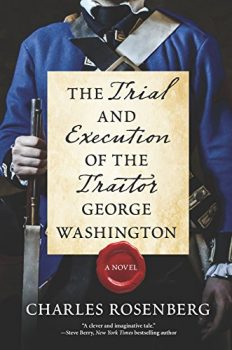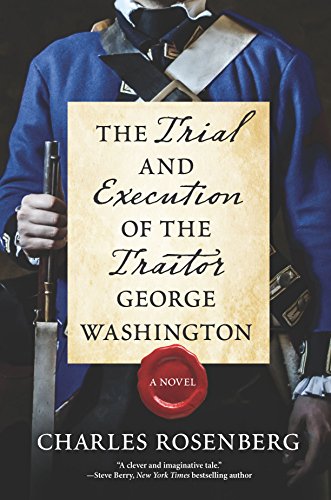
I admit it. The real reason I read alternate history is that I’m fascinated by what-if speculation about the twists and turns of history. What keeps me reading are the imagined consequences that flow from events that didn’t happen or decisions that were never made. To my disappointment, this was not the case with Charles Rosenberg‘s otherwise excellent novel, The Trial and Execution of the Traitor George Washington. I was hoping to learn whether the general was, indeed, the “indispensable man” he has famously been described as being. Instead, Rosenberg elected to tell a simple, straightforward story about the abduction and trial of the American Commander-in-Chief and the circumstances surrounding it. Despite the book’s title (since book titles are often misleading), I was hoping for an alternate history of the early years of the United States after the Revolution, and I didn’t get it.
The Trial and Execution of the Traitor George Washington by Charles Rosenberg (2018) 432 pages @@@@ (4 out of 5)
A secret British operation to kidnap General Washington
In Charles Rosenberg’s alternate history, British Prime Minister Lord North secretly sends Col. Jeremiah Black across the Atlantic with orders to capture George Washington and bring him back to London. There the British will put him on trial for sedition. It’s late fall 1780, and the war is going badly for Britain. The Treasury is not yet bare but is quickly heading in that direction, drained by the twin demands of war with the French and the American debacle. Black’s orders are precise and suspiciously difficult to execute, but the veteran soldier is a resourceful man.
With the active help of a network of Loyalists in New Jersey, he succeeds. Not only does he manage to spirit the American Commander-in-Chief away from his headquarters but to carry him back across the ocean, too. This, despite Washington’ several clever escape attempts.
An opportunity to negotiate an end to the American Revolution
Meanwhile, the Continental Congress quickly follows up Washington’s abduction by dispatching a war hero and well-regarded Philadelphia lawyer named Ethan Abbott to London to negotiate for the General’s release. What follows is a detailed account of Abbott’s efforts to secure an end to the war and return Washington home to America. Conditions seem highly favorable for an agreement, since both sides are hurting badly. But it soon becomes clear in the ensuing negotiations with Lord North that the two objectives are mutually exclusive. And it turns out that Washington has plans of his own. It looks as though all the drama will come to a head in the ensuing courtroom drama.
We never learn if Washington is truly the “indispensable man”
In 1974, an eminent American historian named James Thomas Flexner published the four volumes of what many consider the definitive biography of our first President. The concluding book in Washington: The Indispensable Man won the National Book Award and garnered a special Pulitzer citation. As the title implies, Flexner considered General Washington to be the linchpin of the American Revolution and the country’s early government. And that seems to be a reasonable conclusion to draw from history. Too bad Rosenberg didn’t examine the consequences for the new nation in Trial and Execution.
For further reading
Check out the 10 best alternate history novels reviewed here.
For more good reading, check out:
- The ultimate guide to the all-time best science fiction novels;
- Great sci-fi novels reviewed: my top 10 (plus 100 runners-up);
- Six new science fiction authors worth reading; and
- The top 10 dystopian novels reviewed here (plus dozens of others).
And you can always find my most popular reviews, and the most recent ones, plus a guide to this whole site, on the Home Page.



























